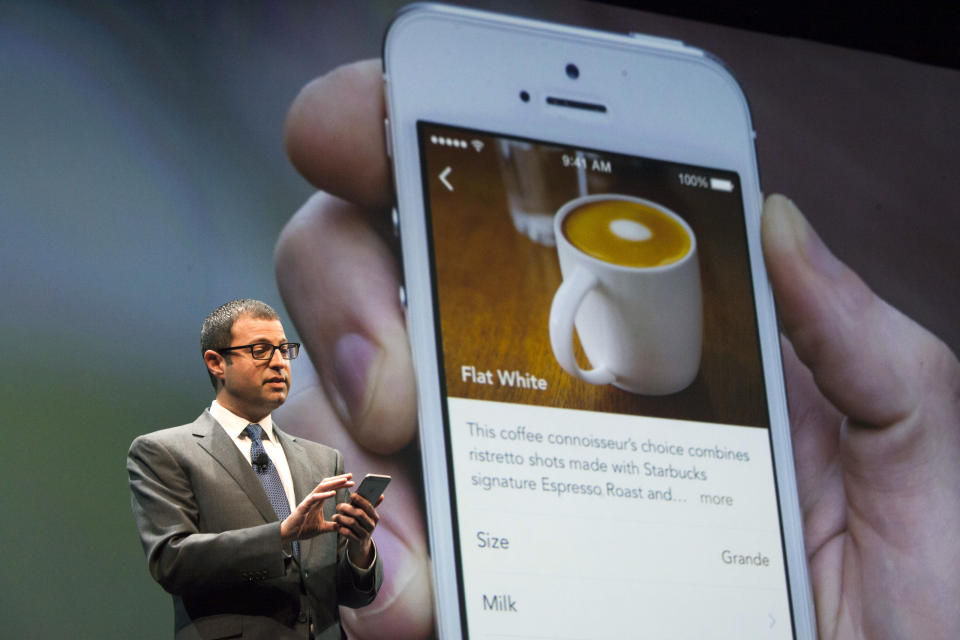Starbucks to license mobile technology, taking a page from Amazon's cloud playbook
Starbucks (SBUX) on Monday agreed to license parts of its mobile and loyalty technology to build a new cloud-based software as a service (SaaS) platform for the broader restaurant industry.
The agreement with newly rebranded restaurant tech company Brightloom, previously known as eatsa, will see Starbucks receive an equity stake and a Brightloom board seat.
Customers will get their first glimpse of the new cloud platform roadmap in October. The size of the equity stake, and exactly who would fill the board seat, were not immediately disclosed.
"At Starbucks, we have experienced first-hand the power that comes through digital customer connections that are relevant to the customer,” Starbucks CEO Kevin Johnson said in a statement.
“The results we've seen in customer loyalty and frequency within our digital ecosystem speak for themselves, and we're excited to apply these innovations toward an industry solution that elevates the customer experience across the restaurant industry," he added.
The deal shows how the coffee giant is taking a page out of Amazon's (AMZN) playbook. Starbucks appears to be doing with its popular mobile app’s technology what the e-commerce giant did with Amazon Web Services (AWS), which has been a huge driver of its growth.
"Starbucks really pioneered the idea of thinking about digital as a relationship by building a platform — not just one feature — but a seamless, interconnected, experience-rich platform that combined loyalty, personalization, ordering, and payment," Brightloom CEO Adam Brotman told Yahoo Finance.
At present, the U.S. restaurant business is approximately a $1 trillion industry, but only about 3% of restaurant orders are digital. The opportunities are growing at a rapid clip.
“Mobile ordering, loyalty, delivery, and even cloud kitchen are becoming something that used to be a nice-to-have to something customers are expecting—and it's exploding,” Brotman added.
As a result, Brotman explained that the problem for restaurant owners is a “terrible choice” between shelling out millions of dollars, or investing years in hiring teams and developing their own technology.
Many don't have that capability, so they cobble together a bunch of solutions from different third-party software service providers.

Enter the Starbucks ‘gold standard’
One of the companies that's been successful in building out a seamless experience is Starbucks. The app is considered the "gold standard" in the restaurant business.
In the past, brands have approached Starbucks asking about licensing the technology, according to Brotman.
Starbucks' deal with Brightloom is probably best compared to AWS, the e-commerce giant's highly-lucrative cloud service offering.
Like Amazon, Starbucks built an industry-leading platform meant for one purpose —and they’re now prepared to make more widely available via the Brightloom deal. The new platform will use components of Starbucks' software intellectual property for ordering, loyalty, personalization, and payments.
That "digital flywheel” will be combined with Brightloom's delivery capability, creating an affordable digital platform available at a one-stop-shop for restaurants of all sizes.
The deal also represents a significant opportunity for Starbucks’ own digital business.
The Starbucks Rewards program is hugely successful in the U.S., with nearly 17 million active members. That said, there's still plenty of room for growth for the global coffee giant, which sees more than 100 million customers enter its stores each week.
Starbucks has more than 30,000 stores across 80 markets—but a little less than half of those markets have the Starbucks mobile app. Meanwhile, only 8 of those markets have the mobile order pickup capability.
Brightloom will work with Starbucks' global licensees to deploy the new cloud offering first. Alsea SAB (Latin America) and Alshaya Group (Middle East and North Africa) are already on board.
Alsea and Alshaya also invested in Brightloom as part of a $30 million funding round, led by Tao Capital Partners and Valor Equity Partners.
Julia La Roche is a finance reporter at Yahoo Finance. Follow her on Twitter.
